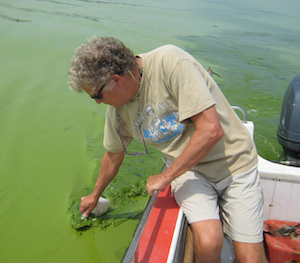press
press release
 August 2012
August 2012
Hans Paerl To Lead Drinking Water Project in China
MOREHEAD CITY, N.C. – China’s third largest lake, Taihu, was once a pristine lake supplying drinking water to over 12 million people. Now the lake has become overrun with toxic blue-green algae or cyanobacteria, which can damage the liver, intestines, and nervous system.
UNC Institute of Marine Sciences professor and aquatic ecologist Dr. Hans Paerl has been awarded two National Science Foundation (NSF) grants, totaling 2.5 million, to lead an international team of researchers working to resolve the ecosystem balance in Lake Taihu. Their work could help safeguard America’s water supply.
“China provides a unique opportunity to test ideas and management efforts in highly polluted and nutrient enriched lakes that we predict we will see in North America in the coming decades,” said Jennifer DeBruyn, one of Dr. Paerl’s collaborators. Dr. Paerl added, “Taihu serves as a ‘looking glass’, enabling researchers and managers to develop proactive nutrient management strategies aimed at protecting our dwindling freshwater supplies and ensuring sustainability of large lake systems worldwide.”
The research team lead by Paerl includes collaborators from five American universities and four Chinese academic institutions. Their goal is to create mathematical models of how ecosystems function based on quantitative data generated by state-of-the-art molecular biological techniques. They will examine all the organisms that could be contributing to the algae blooms, including examining their nutrient requirements and thresholds for a comprehensive picture of how the blooms are created and ultimately controlled.
In the end, they will have a science-based strategy to guide Chinese provincial and central government officials in bringing and maintaining Lake Taihu below the toxic algae threshold. In the process, the researchers will have a strategy transferable to similar lakes globally.
The Lake Taihu project is designed to develop greater academic bridges with China and to promote a global philosophy in dealing with challenges to drinking water supplies and the sustainability of freshwater ecosystems. The research is supported by the NSF’s INSPIRE and Dimensions in Biodiversity programs.
contact: Ashley McKinney at 252/726-6841 or amckin@email.unc.edu//
//
![]()



